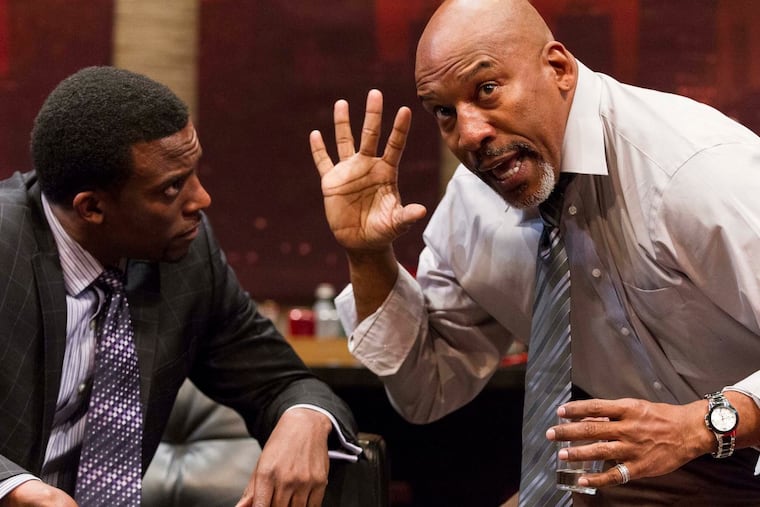Review: 'Playing the Assassin' shows football's power
In 2013, I called David Robson's Assassin a brutal gridiron drama, a verdict that holds up for his revised Playing the Assassin, now in a thrilling production at Delaware Theatre Company.

In 2013, I called David Robson's Assassin a brutal gridiron drama, a verdict that holds up for his revised Playing the Assassin, now in a thrilling production at Delaware Theatre Company.
Robson's play dramatizes the aftermath of a football hit that tarnished one player's career and put its victim in a wheelchair for life. He based it on the 1978 collision between Oakland's Jack Tatum (nicknamed "the Assassin" after his NFL career ended) and New England wide receiver Darryl Stingley.
Decades later, a potential reconciliation looms when CBS executive Lewis (Garrett Lee Hendricks) invites hard-hitting, trash-talking Jack Baker (Ezra Knight) to commit to a televised mea culpa before the Super Bowl. Over 85 minutes, the two collide verbally and physically in an exhilarating conflict directed by Joe Brancato.
Robson's original version, at InterAct and Act 2 Playhouse, teemed with a tragic moral significance rarely encountered in a stage drama about sport (though regularly seen in movies like The Program and TV shows like Friday Night Lights).
His current script builds on his original themes of guilt and recrimination, accidental suffering born of tragic circumstances (the hit didn't violate rules, but Baker, like his real-life counterpart, Tatum, never apologized) and expands the depth of its humanity.
Some credit goes to Knight's ferocious performance; like a tiger, he stalks the stage in a partial crouch, ready to unload on offenders, and instills his braggadocio with authenticity. But much goes to Robson, who has added great insight into the relationship of football to society and the evolution of the game as it has gone from a city-vs.-city sport to a corporate behemoth more bent on coddling millionaires and selling advertising and merchandise than on fueling intense rivalries.
The verbal sparring between the never-played Lewis and the veteran Baker accurately captures how football (and all team rivalry based sport) enables populations to sublimate violent urges into something less catastrophic and localized, no matter how violent that surrogate.
And Knight's constant justifications illustrate the changes wrought by professional football over the last 30 years. Why would Baker (and Tatum) never apologize? You might as well ask why 49er safety Ronnie Lott cut off his own shattered finger rather than miss a game. The game, not salaries, mattered to these players; scoreboards trumped contracts and no player walked back on an on-field persona that fueled his gridiron success.
That Robson can blend such understanding of sport with the tragic power of theater makes this an even greater hit than when first presented and will appeal to theatergoers who never watch football as much as die-hard fans who can now glimpse their game treated with understanding and depth.
THEATER REVIEW
StartText
Playing the Assassin
Through Nov. 8 at Delaware Theatre Company, 200 Water St., Wilmington.
Tickets: $30 and up. Information: 302-594-1100 or www.delawaretheatre.org
EndText